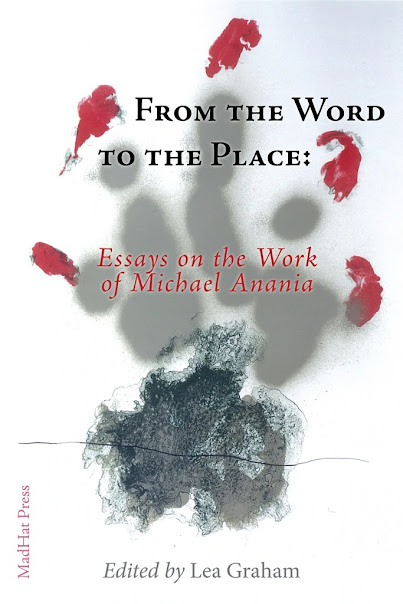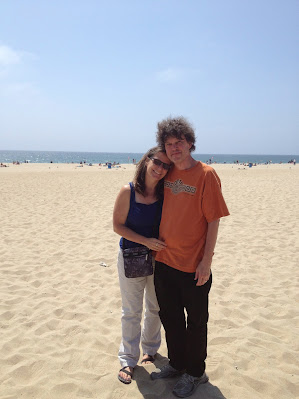Day four of my PhD exams: Poetics. I’ve pretty well aced the first three and this one should be a proverbial stroll in the park. Five or ten minutes of mulling over the prompts and I boldly begin this final exam with what I consider an O’Hara-esque sendup/tribute to the history of poetics. No ideas but in thinks. However, after a page or so I begin to worry that perhaps some part of my committee will perceive this supposed-to-be serious examination essay a bit too much like one of my prose poems and by way of argumentum a simili downgrade or diss this last of my final exams. As my alma mater is the University of Illinois–Chicago, what then is Michael Anania but “my brudder from anudder mudder”? But also, my mentor and at times my proverbial model.
Anania warns a Modern Poetry class that Ezra Pound was not just fooling around with fascism; he informs a workshop student who’s written a quasi-surreal garden poem that she really shouldn’t title it “Strange Fruit.” [During discussion of] one of my lefty poems in a graduate workshop, he likens the radicalism of Percy Shelley to the Communist Party, William Blake’s to the Trotskyites. He suggests I might somehow get into the poem the look or feel of the woodcuts that appeared in New Masses or Rebel Poet. Michael Anania knows where a poem wants to go.
David Ray Vance and Catherine Kasper will fall in love in these workshops. I will try to take Anania up on the woodcuts idea. I will write an essay on the raging debate: is LANGUAGE poetry a revolutionary disruption of the commodification of language or is it pretentious moving wallpaper? Mike Barrett and I will have a beer upon arriving at the UIC Writing Program’s student and faculty readings at the campus lounge one evening. Michael Anania will read the silence and music of his lines.
Coming from a working-class background—as did many of us—Anania reacted to the university with the proper amounts of respect for intelligence and creativity and irritation with academic applesauce (it’s not made from real apples). He handled the academic milieu with confidence and he built with us a camaraderie poetical ever after. He dedicated the poem “Considerations in Time” in Heat Lines to David and Catherine. Anania argues the LANGUAGE poets are postmodern surrealists. In workshop he tells the story of Carl Sandburg at an event for the Brotherhood of Sleeping Car Porters. Sandburgh is up on the stage repeating the union’s name again and again to hear the music, the beauty of the name and what it stands for. The Brotherhood. Of Sleeping Car. Porters. The Brother. Hood of Sleep. Ing Car Porters. “It’s something a poet would do,” Anania explains, “but it didn’t go over well with the whole audience.”
This is the fate of my final essay as well. One [doctoral committee] party pooper misconstrues my serial sketches as moving wallpaper. Then there’s the clatter and clamor of my heart in my brain as I get nervous at the first of the oral exams. But years later when Michael Anania retires, I take up the argumentum a simili as sword and shield—or maybe crucifix and wooden stake—and do us both proud.
Gratia, Poeta!
Well, that settles it. I looked up her website and there’s
not one
mention of Charisma Carpenter, who plays the role of
Cordelia
on the TV show Angel,
being the daughter of John Carpenter
(director of Vampires,
Ghosts of Mars, Prince of Darkness, the
original Halloween,
and the remake of The Thing). This
means the
greatest father/daughter horror team of all time existed
only in
my imagination, a
word for a concept that has pretty much always
been with us poets, albeit in a somewhat ambiguous
relationship
with fancy, that
being an abbreviation of fantasy,
from the Latin
phantasia, itself a transliteration from the Greek, making all these
terms more or less kissing-cousins, but I don’t want to get
all
ancient aesthetically philosophical or etymologically
medieval
on you, so I’ll skip right to the part where Michael Anania
used
to mention in workshops that getting into and out of the
poem
were two of the most difficult tricks for a poet. Also, he
made it
clear that you have to earn your O’s. In the postmodern world
of today the time’s long past when the poet can get away
with
exclaiming all over the poem, let alone apostrophizing this,
that,
and the other Muse. People just can’t suspend disbelief in
your
transmogrification of an abstraction. When I first signed on
as
an undergrad, I was like, “Yeats, Yeats, Yeats.” I sounded
more
like a poodle than a poet. Michael Anania and Ralph Mills
were
kind enough to bring me over to America and plant me a bit
more firmly in the 20th century—William Carlos
Williams, Ezra
Pound, Frank O’Hara, Susan Howe. It’s a good thing too. I
stopped
dreaming of ascending in the ranks of The Hermetic Order of
the Golden Dawn—from novice to cloak-holder, I’d fancy—and
started thinking more seriously about poetics in the late 20th/
early 21st century, which, of course, reminds us
that Angel is a
spin-off from the TV version of Buffy the Vampire Slayer, which
stars Sarah Michelle Gellar and apparently is going off the
air this
spring. The character Angel, played by David Boreanaz on the
eponymous TV show, is a vampire cursed with a soul so that
he
suffers remorse over the evil he has committed and now wants
to
fight for justice—and also for truth and beauty, I like to
think, you
know, being a poet and all. In his role as professor of
literature, if
Michael found you reading Nova in class, instead of, “That doesn’t
go here,” it’d be, “You read Chip Delany?” He wouldn’t
express
the same enthusiasm for, say, Stephen King. I’m on my own
there.
Michael doesn’t read anything more graveyard than the graveyard
poets, who were a meditative and melancholy bunch, and guess
what was their favorite setting for those
meditations—meaning I’m
grateful that a poet who could see exactly where any poem
wanted
to go spent time on my poetry, which always wants to go places
like Frankenstein’s laboratory, Dracula’s crypt, Freddy
Krueger’s
boiler room, Its sewer main, the Dead’s shopping mall
outside of
Pittsburgh, and the Bates’ Motel. Named after an Avon
perfume,
Charisma Carpenter began playing the role of Cordelia, a
high
school friend of the vampire slayer, on Buffy and then graduated
to Angel with that
show’s premiere. And though Charisma had
only a handful of commercials and a guest appearance on Baywatch
on her resume, and though Sarah Michelle Gellar has starred
in
Scooby-Doo, won a Blockbuster Award for Best Supporting Actress
for her role in I Know
What You Did Last Summer, and has become
a spokesperson for Maybelline, I’ve always thought Charisma
the more interesting actress. Sexier too, especially now
that she’s
impregnated with a demon fetus and positively evil herself.
(You
would think people would be negatively evil, but it never works out
that way—some situations simply cry out for an oxymoron.) I
guess
you could say that for me Sarah Michelle Gellar is like the
fancy
and Charisma Carpenter the imagination. In the Romantic
sense
of the terms. You know, where Blake’s like, “Imagination is
spiritual
sensation” and Coleridge is like, “It dissolves…in order to
recreate
or…to idealize and to unify,” comparing the imagination (in
a
more or less roundabout way) to “the eternal act of creation
in the
infinite I AM.” Where fancy “is no other than a mode of
memory
emancipated from the order of time and space.” Now you can
see
why John Carpenter should be her father. With his fine sense
of
the horror film ad her presence and acting skill, why, we’d
return
to a new heyday of horror, one recalling sublime partnerings
of
previous eras—Elsa Lanchester and James Whale, Janet Leigh
and
Alfred Hitchcock, Jamie Lee Curtis and John Carpenter. Not
that
I’m in any way putting down Sarah Michelle Gellar. Even
though
William Carolos Williams says, “Yes, the imagination, drunk
with
prohibitions, has destroyed and recreated everything afresh
in the
likeness of that which it was,” the fancy is no slouch
either. It may
even be—since imagination
came to be used by the Romans as a
substitute for phantasia—that
fancy and imagination are cousins
that’ve been doing more than kissing. Or they are Siamese
Twins.
And if I were still a member of the Hermetic Order of the
Golden
Dawn, I’d have to wonder whether there wasn’t some cosmic
conspiracy at work when Buffy
the Vampire Slayer goes off the air
at the same time Michael Anania retires. Well, there
probably is. I
mean, how do you thank someone for sharing his knowledge of
poets and poetry, his way with line breaks and pentameter.
Those
of us who’ve learned from Michael Anania consider ourselves
spin-offs from a more critically acclaimed, popular, and
longer
running TV show. Coleridge’s secondary imagination related
to
the primary imagination, so to speak. Whoa! All these
imaginations
and fancies in my head! They’re making me dizzy and I didn’t
even take my antihistamine today. And did you ever notice
how
the pharmaceuticals these days sound like something from the
old
Flash Gordon series? With his pals, Dr. Zyrtek and
Dale Allegra,
Flash faces the Emperor Ming and the evil Princess Viagra.
By
the way, I thought I saw Michael Anania on TV, standing next
to
Mayor Daley at a celebration of Chicago’s one hundred and
sixty-
fifth year, and I thought, “Wouldn’t that be something if
Michael
retired into a whole other career: his own TV show—if not on
the
WB, perhaps on UPN, in the time slot Buffy’s left unfilled.” It’s not
unheard of—a poet on TV. Somebody told me he’d seen Charles
Bernstein reading a phone book with Jon Lovitz on a Yellow
Pages
Commercial. Can you imagine? Longinus sees in the
imagination
the source of the sublime when “moved by enthusiasm and
passion
you seem to see things whereof you speak and place them
before
the eyes of your hearers.” Anyway, it’s certainly a show I’d
watch,
whether Michael played a vampire slayer or a poet/professor.
And
O! Charisma Carpenter! If you would co-star with him, that
would be marvelous!
from From the Word to the Place ed. Lea Graham
MadHat Press, 2022
reprinted with permission
Frank Rogaczewski lives with his wife and comrade Beverly Stewart in bee-yoo-ti-ful Berwyn, IL with their dear dog, Seamus, their dear foster dog, Kitsu, and their lovely literary cats, Gertrude and Virginia. Frank is now responsible for two books of prose poetry, The Fate of Humanity in Verse and Jeepers and Criminy! Are You Following This? A Helpful if Inexact Proletarian/ Smart Ars Poetic Manifesto. An adjunct English instructor and leftist for many years, he continues to move to the left.



